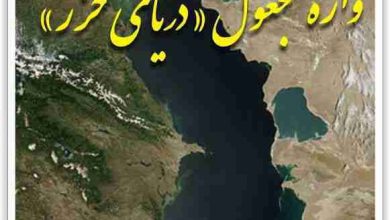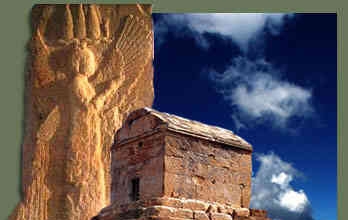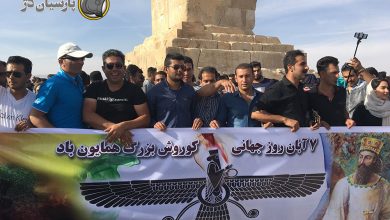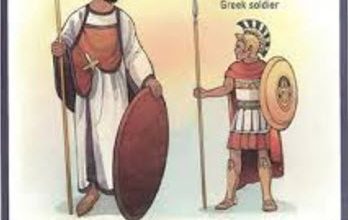Did Cyrus kill the people of the city?!(Ghiyasabadi's distortion of Xenophon's writings)
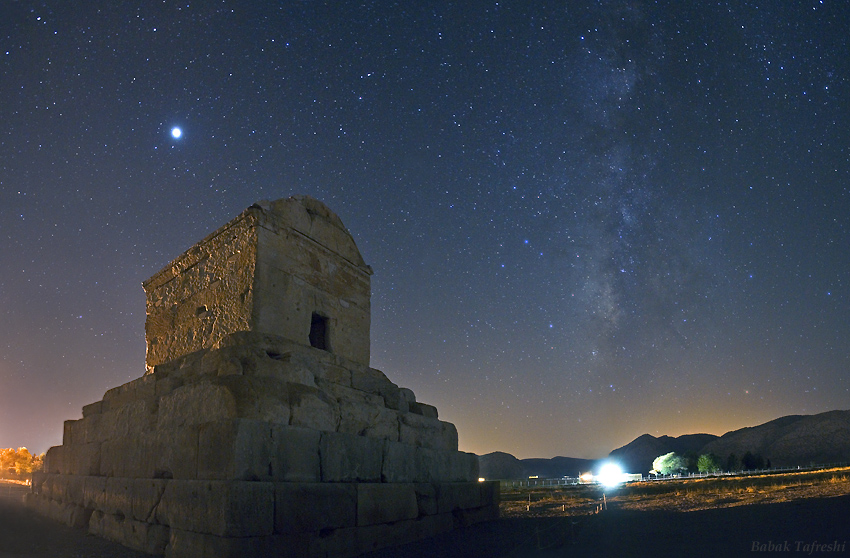
the writer: Fereydoun Formzar
Taken from the review website of Reza Moradi Ghiyathabadi
City dwellers or battlefield?!
Ghiyasabadi writes in a strange claim:
In the third chapter of the third book, it is mentioned that Cyrus and his troops killed so many of the city's inhabitants that "the women started wailing and running madly in all directions.". They were holding their children and begging the few survivors not to leave us alone and homeless.».
look at: Cyrus the Great and confiscation of historical documents, Reza Moradi Ghiyathabadi, Monday, February 3, 2010
Again, Mr. Ghiyasabadi did not consider the more important things that were said before and after this event and instilled something upside down..
First of all, this event does not happen in the city, but in the battlefield, and it may be unclear what the women are doing in this commotion.! Xenophon explains in the third part of the fourth book that in Asia the warriors took their women and their possessions with them.:
It is known that until today, whenever the tribes of Asia decide to go to war, they take their most valuable possessions with them.. They say that against that beautiful Rokhan, the warriors of their lost hearts will fight better; Because the desire to follow and guard those expensive treasures grabs their hearts and minds. Maybe it was like that and maybe the fires inside [Sexual needs] Let it be the reason.
Xenophon's Korosh Nameh, book 4, section 3, paragraph 2, translated by Abolhassan Tahami
The event in question happened on the battlefield and what Ghiyasabadi says (They killed a lot of the people of the city), is completely rejected.
Now let's see what the truth was. Xenophon examines the first war between Cyrus and the Assyrians in the third part of the third book. The troops of Cyrus charged the enemy with all their bravery, and some of the enemy troops preferred to run away.. It is at this time that women and other allies of the Assyrians from Assyrian fugitives Please that don't run away. Then the Assyrian princes gather, and due to the small number of his troops compared to the enemy, Cyrus does not see it acceptable for his troops to enter the enemy's camp; Hence he orders to retreat.
look at: Xenophon's Cyrus Letter, book 3, section 3, paragraphs 63 to 70
So the issue is not at all what Mr. Ghiyathabadi says and there is no question of killing citizens at all.
Here, unfortunately, Mr. Ghiyath Abadi in a disgusting and cowardly act, even the translation of Reza Meshaikhi(The translation cited by Ghiyasabadi) has also changed.
It is mentioned in the translation of Reza Meshaikhi:
"From the fugitives They were suing."
Koroshnameh Ghaznoun, book 3, section 3, paragraph 67, translated by Reza Meshaikhi
It is strange that Ghiyasabadi writes this part like this:
"From The few who survivedThey were suing…»
Perhaps Xenophon here wants to show the cowardice of some Assyrian troops and the difference between Cyrus's troops, who have high goals to fight, and that is to defend their land; with the Assyrians to show that they are cowards.
It is not mentioned here that anyone was taken prisoner and the withdrawal of Cyrus's army is mentioned, but apart from this event, it should be noted that Xenophon mentions Cyrus' good treatment of captives in other parts of the Cyrus Book.. According to Xenophon, Cyrus freed the captives, which we will discuss further.
Has the massacre of the people of Nineveh happened?!
Ghiyasabadi claims that according to Xenophon's Cyrus letter, Cyrus the Great massacred the people of Nineveh.. In an article titled "The great Cyrus and the massacre of the people of Nineveh" is writing:
they [Cyrus's troops] While the city was full of joy and celebration, they entered the city and killed everyone they saw.. Xenophon quoted that: Cyrus ordered his cavalry and soldiers to kill everyone they found in the streets..
After this victory, the first action of Cyrus and his troops was to thank the gods for this victory, and he allocated a share of the spoils from the looting of the city to the temples of the gods..
Cyrus also ordered to confiscate the houses of the elders of the city and hand them over to the generals who had fought more.. He authorized the men under his command to keep prisoners of war under their control.
Cyrus ordered the people of Nineveh to obey the ruler he appoints and engage in farming so that they can pay the necessary tribute and spoils..
look at: Human sufferings 179: Cyrus the Great and the Massacre of the People of Nineveh, Reza Moradi Ghiyathabadi, Friday, July 9, 2011
This section is the section related to the conquest of the city of Babylon, and in most translations, the word "Babylon" was used in this section.. But in Reza Meshaikhi's translation, the word "Ninewa" is used. About the conquest of Babylon, we have more important sources such as the charter of Cyrus and the event letter Nebonid-Cyrus.
But here we will examine the statements of Xenophon and the distortions of Ghayasabadi.
Ghiyasabadi writes:
"Them [Cyrus's troops] While the city was full of joy and celebration, they entered the city and killed everyone they saw with a blade.
But the text of Xenophon's Cyrus is like this:
The army started going into the city, and from Those who faced them They were killed and fell to the ground…
Xenophon's Korosh Nameh, book 7, section 5, paragraph 26, translated by Abolhassan Tahami
It is known that according to Xenophon's Cyrus book, Cyrus' troops clashed with the warriors and killed them..
Ghiyasabadi writes further:
Cyrus ordered his cavalry and soldiers to kill everyone they found in the streets…»
But the original text of Xenophon's Cyrus is like this:
Cyrus sent groups of horsemen to the barzans and koi and ordered them to throw anyone they see in the streets to the ground, andTo those who knew how to speak Assyrian He ordered them to shout in the streets and alleys and tell the residents to stay in their houses. If they don't want death.
Xenophon's Korosh Nameh, book 7, section 5, paragraph 31, translated by Abolhassan Tahami
Cyrus sent squadrons of cavalry down the different roads with orders to kill all they found in the street, whilethose who knew Assyrian were to warn the inhabitants to stay indoors under pain of death
The same, translated by Henry Graham Dakyns
By removing an important part of this episode, Ghiyasabadi has introduced another issue. It is quite clear that Xenophon wants to say that Cyrus issued such orders in order to control the situation. It is clear that residents were informed that they would be killed if they stayed in the streets, and this issue was brought up to control the situation. Xenophon does not say anything about anyone being killed by Cyrus' soldiers; And he talks about the good behavior of Cyrus with the people (Explanations will be given in the following).
However, these are some of the thousands of traditions that are said about Cyrus. As we said at the beginning of the discussion, "in this article, before we look for what Cyrus did; We are looking for what Xenophon wrote. Now, in another detailed discussion, we can investigate the correctness or incorrectness of each of them."
But since it seems that this statement of Xenophon was written in the part related to the conquest of Babylon, and we have detailed documents such as the charter of Cyrus and the event letter of Nebonid-Cyrus available; In the following, the correctness or incorrectness of such narrations - of course very short- We will assess it.
Ghiyasabadi writes further:
"After this victory, the first action of Cyrus and his troops was to thank the gods for the victory and a share of the spoils from Looting the city allocated to the temples of the gods.
Here, Ghiyasabadi realized that the spoils were obtained from the looting of the city, and nothing like this is mentioned in Xenophon's Cyrus Book.. The original text is as follows:
from them [Mughan] He asked for lands to build a place of worship and the first fruits of victory and the Parvehs (The spoils) choose for the Lord.
Korosh Nameh of Xenophon, book 7, section 5, paragraph 35, translated by Khashayar Rokhsani
Xenophon does not say anything about looting the city. Of course, it is natural that there were many trophies in the courts of the enemy's government, and these things always benefit the victors..
Ghiyasabadi writes further:
Cyrus ordered the people of Nineveh to obey the ruler he appointed and to engage in farming. to be able Pay the necessary tribute and trophies.
But Xenophon writes:
At the same time, he sent orders to the Babylonians to plow their fields and scatter seeds and pay their tributes to the newly appointed commanders.…
Korosh Nameh of Xenophon, book 7, section 5, paragraph 36, translated by Abolhassan Tahami
Here, Ghiyasabadi, by quoting the sentence "so that they can pay the necessary tribute and spoils", has implied that the people had to work only to pay the tribute, if Xenophon wants to say that new commanders were appointed to collect taxes. do to establish a regular routine. We will see that Cyrus was thinking about people and doing good to them. According to Xenophon's Cyrus letter, it is clear from here that the conquest of the city by Cyrus did not cause disruption in the daily life of the people.. People continued their work and soon everything fell into place.
According to Xenophon, Cyrus behaved well with the people of the city (Contrary to Ghiyasabadi's statements)
It is not clear why Ghiyasabadi mentioned the article after these topics in Xenophon's Cyrus letter, which indicates kindness to the people, before entering into this topic..
Mr. Ghiyathabadi has written again under the influence of few reviews:
"He authorized the men under his command to keep the prisoners of war under their control."
Here again we see a problem in the translation of Mr. Reza Meshaikhi and it seems that once again Mr. Meshaikhi did not translate this part well.. Here again, in order to prove this issue, we refer to other translations:
Khashayar Rakhsani:
Many of his relatives he chose to stay with him, he ordered them to treat those under his command as a servant would treat his servants..
Henry Graham Dakyns:l
As for his partners the Persians, and such of his allies as elected to remain with him, he gave them to understand they were to treat as subjects the captives they received
ابوالحسن تهامی:
His fellows - Persians and allies who were chosen to be by his side- He said to treat the people of Babylon as subjects and be subservient.
Cyrus Name of Xenophon, book 7, section 5, paragraph 36
We can accept that it is said here to treat them like the captives they took or the subjects they had. Anyone who has read Xenophon's Cyrus from the beginning will realize that Cyrus treated the captives well and, as mentioned before, he set them free and allowed them to do their former work and agriculture. Is.(look at : Xenophon's Cyrus Letter, book 4, section 4, paragraphs 10 and 11 and also Xenophon's Cyrus Letter, book 3, section 2, paragraph 12)
So we understand that Cyrus meant that they should treat them well, just like the captives and subordinates who had treated them well before this.. This good behavior is completely evident in Xenophon's statement and proves this issue.
Xenophon continues to write about the words of Cyrus about dealing well with the people of Babylon, Cyrus tells his friends in a council:
Not only my work and yours, but also the work of these people, which is on us to take care of them. That's why I ask you to vote and advise me…
Xenophon's Korosh Nameh, book 7, section 5, paragraph 47, translated by Abolhassan Tahami
According to Xenophon's writings, Cyrus gives a speech after settling the governmental situation in Babylon:
maintenance and narrative command over them [the countries] Without self-restraint, deep thinking and care, the loving and endless inhabitants of that vast country cannot be done.
Korosh Nameh of Xenophon, book 7, section 5, paragraph 76, translated by Abolhassan Tahami
Or in another place, Cyrus says in general:
Closing people's hearts is not done with rudeness and harshness, but with loving care and sorrow.…
Korosh Nameh of Xenophon, book 8, section 7, paragraphs 37 and 38, translated by Abolhassan Tahami
But Mr. Ghayasabadi has not mentioned these issues at all!
We return to Mr. Ghiyathabadi's article: Cyrus the Great and the massacre of the people of Nineveh
As you can see, there is no mention of the massacre of ordinary people. If the people of the city had been massacred, what is the meaning of leaving the tax collector and doing good and giving to the people as stated in the Cyrus letter?!
A game with words
As you can see, if we want to select sentences and examine each one separately without examining what comes before and after the text; Differences can be seen in the words of the translations. We should not play with words! Anyone who reads this section of Xenophon's Letter to Cyrus will understand that Xenophon wants to state in this section that Cyrus did what Cyrus's commander, the soldiers and the people wanted from him with his good, flawless and just management. be satisfied.
Xenophon writes at the beginning of the book:
Thus, with the deep thinking that we collected in this example, we reached this result, that according to the gem that a person is made of, to overcome any of the creatures (Creatures) It is much easier than conquering people. But if we extend this measurement to subjugating a large number of people, people of cities and countries, we will inevitably change our opinion, and we will say that conquering people can be a task that is neither impossible nor impossible. (Even) Difficult, if one proceeds wisely in doing it. However, we know that the people wanted to follow Cyrus, although some of them were away from him as many days and others as many months.…
Korosh Nameh of Xenophon, book 1, section 1, paragraph 3, translated by Khashayar Rokhsani
Throughout the book, Xenophon writes Moradi to explain what made "the people want to follow Cyrus".. What Ghiyasabadi says is just playing with words, without considering the contents before and after Xenophon's Cyrus..
گزنفون
Checking the authenticity of these narrations
Usually, researchers in historical debates and investigating the performance of a character like Cyrus, who has been told different stories about him by different historians; Various sources such as Greek sources, Jewish sources and even Ferdowsi's Shahnameh… put them together and examine their commonalities. Fortunately, valuable antiquities such as Cyrus the Great's Charter and Do Not Build Events - Cyrus and even Don't Build Charters(The last king of Babylon) It has been found that they are in harmony with each other and it can be said that they are placed in a higher position in terms of credibility than what the Greek historians said..
The researcher asks himself several questions when he comes to each narrative. Is there an error in the source? Do the sources agree with this narrative? Does any external evidence support this narrative? which source(which is more valid) should we base it on?… . After detailed investigations, a conclusion is reached. It is not possible to accuse someone in court and without examining the documents and evidence and investigating the truth or falsity of the statements, give the death sentence to that accused.. Historical discussion also has such a state.
Indeed, when are the oldest copies of books left by Greek historians?! Are we sure that there have been no changes in the narrations of these historians?! In examining Xenophon's Cyrus, researchers have reached interesting results. Some people do not consider the eighth part of the eighth book of the Cyrus Letter to be the words of Xenophon; Because he does not have Xenophon's style of writing and he returned with the book in mind(Another work of Xenophon) Parts of it are rejected. It seems that redactors added it to the book after Xenophon's death. Also, by examining the sources, we realize that the narratives of Greek historians are mixed. Of course, perhaps the status of Xenophon's Cyrus is better in this regard; Because it seems that the writings of Herodotus and Ctesias are mixed with Greek legends, but the writings of Xenophon are mixed with the narratives of other Persian and Median men.. It is interesting that in Xenophon's Cyrus, contrary to Herodotus and Ctesias, there are no unbelievable legends, and it seems that there was a wisdom and extensive research behind it, and of course it should be noted that parts of Xenophon's Cyrus are in harmony Very interesting with Iranian narratives such as Shahnameh and… and this issue adds to the value of Korosh's letter.
Anyway, even if we accept that these are the words left by Xenophon himself, there is still a possibility of mistakes by Xenophon, because Xenophon lived many years after Cyrus the Great, and every historian and every researcher may forget something unintentionally. Mix two things together. At the time of Xenophon, there was a possibility of inadvertent errors. But Xenophon made a very good impression with this work, and even many of his statements may be true, but it is not true to accept his statements 100%..
Therefore, it can be said that the obtained ancient works have a higher degree of credibility and can be used as a basis. Especially when the three important ancient sources, namely the Charter of Cyrus the Great, do not write events- Cyrus and Nebonid cylinder confirm each other.
In the charter of Cyrus and the chronicle of Nebonid-Kyrush, it is mentioned about the conquest of Babylon without a war and the worthy behavior of Cyrus the Great with the people of Babylon.. It can be said that the narratives related to how the city was conquered in Xenophon's words are mixed with the narratives of other people..
Xenophon writes:
The army started going into the city, and some of those who confronted them were killed and fell to the ground.…
Xenophon's Korosh Nameh, book 7, section 5, paragraph 26, translated by Abolhassan Tahami
But this is how it is stated in Cyrus' charter:
(And when) My many soldiers[Cyrus] Friendly people were walking inside Babylon, I didn't let anyone (in a place) be terrifying in all the lands of Sumer and Akkad.
Clause 24 of Cyrus the Great Charter, translated by Abdul Majid Arfai
Also, the event of Nebonid Cyrus is like this:
On the sixteenth day, Ugbaru(Gubrias), commander of Gutium(Probably Sarzmin said yes) And Cyrus' army entered Babylon without a fight.
Nebonid-Korush's event letter, column 3, paragraphs 15 and 16
It is possible that the narratives that Xenophon wrote about the confrontation with the warriors; belonging to another person (Perhaps Cyrus I, grandfather of Cyrus the Great) May he conquer a city. But Xenophon's later narratives, which indicate Cyrus' good behavior with the people of Babylon, are related to Cyrus II (big) be; Because the Charter of Cyrus the Great and the Chronicle of Nebonid-Cyrus and even the Jewish sources have relative harmony with this part of Xenophon's Cyrus.
However, Greek sources provide us with useful information and we can draw commonalities from them and analyze them.. When we put the sources together, everyone agrees on the humane and good deeds of Cyrus, and therefore most researchers have a positive opinion of Cyrus.. But this positive opinion is not true for all Achaemenid kings. Why doesn't anyone say anything about Ardeshir III?! Because most of the time, Cyrus is mentioned well; It is due to detailed historical investigations. But I don't know, today, a person who spreads false things in the virtual space by distorting and transforming them without careful investigations; What are you looking for?!
Full article:This article was only a part of a complete article about the distortion of Xenophon's writings by Reza Moradi Ghiyasabadi..
Ghiyasabadi and confiscation of historical documents
Also, the readers of this article should keep in mind that since Mr. Ghiyath Abadi is known by many researchers of Iranian history and they know that he intends to distort the history of Iran, anti-Iranians and distorters have recently rejected Mr. Ghiyath Abadi's content. Without mentioning his name They publish.
Taken from the website((Criticism of Reza Moradi Ghiyathabadi)) Written by Mr. Faridun Formzar
look at:
Did Cyrus kill the people of the city?!(Ghiyasabadi's distortion of Xenophon's writings)
This article according to The new policy of Parsian Dej It is placed on this website.


